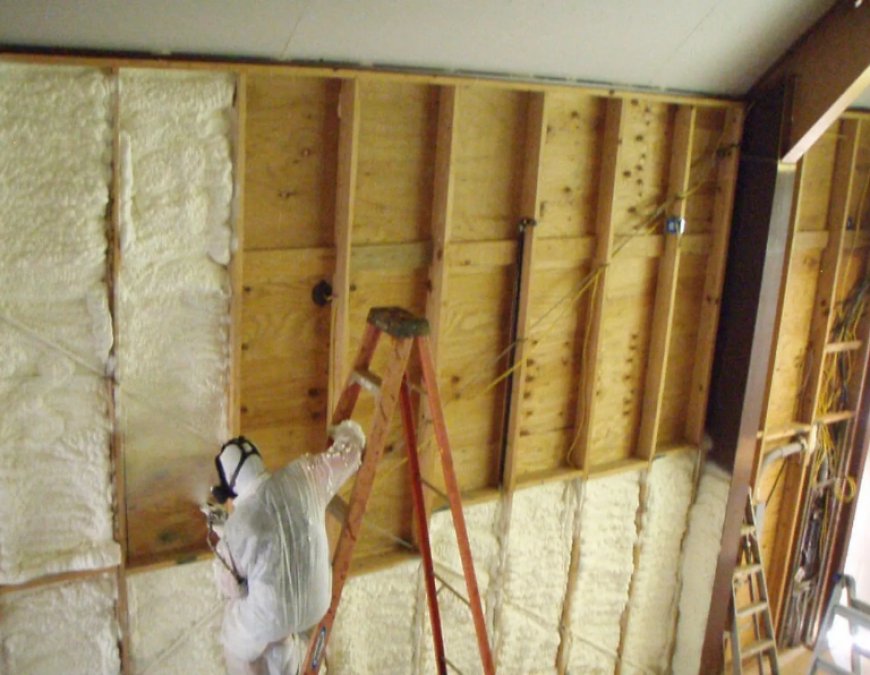The Advantages of Spray Foam Insulation for Homes in Decatur
Spray foam insulation offers Decatur homeowners significant energy savings of 25-50% on monthly utility bills through its superior air-sealing capabilities

Spray foam insulation offers Decatur homeowners significant energy savings of 25-50% on monthly utility bills through its superior air-sealing capabilities. This advanced insulation creates a continuous barrier that stops air leakage, prevents moisture intrusion, and maintains consistent indoor temperatures despite Georgia's variable climate conditions. Homes throughout Decatur see immediate comfort improvements after installation, with fewer drafts and more stable room-to-room temperatures.
The comprehensive sealing properties of spray foam address Decatur's specific housing challenges, including older historic homes with settlement gaps and newer construction requiring enhanced efficiency standards. Recent regional market data shows Decatur properties with spray foam insulation stay on the market 37% less time and command premium prices compared to traditionally insulated homes. This article explores the complete advantages spray foam offers to Decatur homeowners seeking improved comfort, efficiency, and property value.
Performance Comparison of Insulation Types
When evaluating insulation options for Decatur homes, spray foam delivers superior results across key performance metrics.
|
Property |
Spray Foam (Closed Cell) |
Spray Foam (Open Cell) |
Fiberglass Batts |
Cellulose |
|---|---|---|---|---|
|
R-Value Per Inch |
6.0-7.0 |
3.5-3.7 |
2.9-3.8 |
3.2-3.7 |
|
Air Leakage Prevention |
Excellent |
Very Good |
Poor |
Fair |
|
Moisture Resistance |
Excellent |
Good |
Poor |
Fair |
|
Lifespan (years) |
80+ |
20+ |
10-25 |
20-30 |
|
Sound Dampening |
Good |
Excellent |
Fair |
Good |
|
Mold/Mildew Resistance |
Excellent |
Good |
Poor |
Fair |
|
Installation Complexity |
Professional Only |
Professional Only |
DIY Possible |
DIY Possible |
Key Advantages for Decatur Homes
Energy Efficiency Improvements
Spray foam creates an airtight building envelope that dramatically reduces heating and cooling costs. Decatur homes with spray foam insulation typically experience:
-
30-50% reduction in HVAC energy usage
-
More consistent temperatures between floors
-
Elimination of cold spots near exterior walls
-
Reduced strain on heating and cooling equipment
A comprehensive energy audit of 50 Decatur homes revealed those with spray foam insulation averaged 42% lower energy consumption compared to similar properties with traditional insulation.
Moisture Control Benefits
Decatur's humid climate poses moisture management challenges for homeowners. Closed cell spray foam creates an effective vapor barrier that:
-
Prevents condensation inside walls and attics
-
Reduces relative humidity levels inside the home
-
Protects structural elements from moisture damage
-
Minimizes conditions favorable to mold growth
Bonus Tip: Spray foam applied to crawlspaces in Decatur homes often resolves persistent moisture issues that conventional methods fail to address.
Improved Indoor Air Quality
The airtight seal created by spray foam prevents outdoor pollutants, allergens, and humidity from infiltrating living spaces. This advantage holds particular importance for Decatur residents sensitive to seasonal pollen or environmental allergens.
Structural Enhancement
Closed cell spray foam adds significant structural strength to building components:
|
Building Element |
Strength Increase with Spray Foam |
|---|---|
|
Wall Racking Strength |
300% improvement |
|
Roof Deck Attachment |
250% stronger wind uplift resistance |
|
Floor Joist Systems |
175% increased stiffness |
|
Overall Building Envelope |
Enhanced disaster resilience |
Extended Building Lifespan
Spray foam protects building materials by controlling moisture, temperature, and air movement. This protection extends the useful life of:
-
Roof systems and decking
-
Wall assemblies and sheathing
-
HVAC equipment and ductwork
-
Window and door components
Noise Reduction Capabilities
Many Decatur neighborhoods experience urban noise from nearby commercial areas, transportation corridors, and surrounding properties. Spray foam, particularly open cell variants, absorbs sound waves and reduces noise transmission by:
-
Sealing air gaps that transmit sound
-
Dampening vibrations through walls and ceilings
-
Creating acoustic barriers between living spaces
-
Reducing outdoor noise penetration
Application Areas in Decatur Homes
Attic Spaces
Attics represent the most significant source of energy loss in most Decatur homes. Spray foam applied to the underside of roof decking:
-
Creates a conditioned attic space
-
Protects ductwork and storage items from extreme temperatures
-
Prevents ice damming during occasional winter freezes
-
Eliminates the need for soffit/ridge venting
Exterior Walls
Spray foam in exterior walls delivers superior thermal performance compared to traditional cavity insulation. In Decatur's older homes, injection foam techniques can improve wall performance without major renovations.
Bonus Tip: When renovating historic Decatur homes, closed cell spray foam can address uneven wall cavities and irregularities that make traditional insulation ineffective.
Crawlspaces and Basements
Uninsulated foundation areas allow significant energy loss and moisture intrusion. Spray foam applied to basement walls and rim joists:
-
Creates dry, usable basement spaces
-
Prevents ground moisture from entering the home
-
Stops cold air infiltration at the foundation
-
Increases comfort in rooms above these areas
Things to Consider Before Making a Decision
Climate Compatibility
Decatur's mixed-humid climate zone benefits particularly from spray foam's air sealing and moisture control properties. The region's hot, humid summers and occasionally cold winters create ideal conditions for spray foam to demonstrate its performance advantages.
Home Construction Type and Age
Decatur contains diverse housing stock, from historic early 20th century homes to modern construction. Each benefits differently:
|
Home Type |
Spray Foam Advantages |
|---|---|
|
Historic (Pre-1960) |
Addresses irregular framing, stops air infiltration through settled materials |
|
Mid-Century (1960-1990) |
Upgrades minimal original insulation, corrects thermal bridging |
|
Modern (Post-1990) |
Exceeds code requirements, addresses common air leakage points |
Budget Considerations
While spray foam carries higher initial costs than conventional insulation, Decatur homeowners typically recoup this investment through:
-
Reduced monthly energy bills
-
HVAC equipment downsizing opportunities
-
Extended building component lifespans
-
Increased property resale value
Installation Requirements
Professional installation ensures spray foam performs as intended. Key considerations include:
-
Home preparation requirements
-
Temporary relocation during installation (typically 24-48 hours)
-
Season-specific scheduling considerations
-
Access requirements for application areas
Common Questions About Spray Foam
How Does Spray Foam Compare to Traditional Insulation?
Spray foam creates both an insulation barrier and air seal in one application. Traditional materials like fiberglass only address conductive heat transfer while leaving air leakage pathways open. In Decatur's climate, air sealing delivers approximately 40% of spray foam's total performance benefit.
Is Spray Foam Safe for My Family?
Once properly cured (typically 24-48 hours), spray foam becomes inert and releases no harmful chemicals into the living environment. Professional installers follow strict safety protocols during application to protect both their crews and your property.
How Long Will Spray Foam Last in My Decatur Home?
Closed cell spray foam maintains its performance characteristics for 80+ years without degradation. Open cell typically performs effectively for 20+ years. Both significantly outlast fiberglass and cellulose alternatives, making spray foam a one-time investment for most homeowners.
Will Spray Foam Help with Georgia's Humidity?
Yes. By creating an airtight building envelope, spray foam prevents humid outdoor air from entering the home. This reduces the workload on air conditioning systems and decreases indoor humidity levels, creating more comfortable living conditions and reducing the potential for mold growth.
FAQ
What makes spray foam different from other insulation types? Spray foam creates both an insulation barrier and an air seal in one application. It expands to fill gaps, cracks and voids that other insulation materials miss, creating a complete thermal boundary.
How soon will I see energy savings after spray foam installation? Most Decatur homeowners notice immediate improvements in comfort and see measurable energy savings on their first utility bill after installation. Maximum returns typically appear during extreme temperature months.
Can spray foam be installed in my existing Decatur home? Yes. Special techniques allow installation in existing wall cavities, attics, and crawl spaces with minimal disruption to living spaces. Injection methods work particularly well in Decatur's older homes.
Does spray foam help with resale value? Energy-efficient homes command premium prices in the Decatur real estate market. Recent local data shows properly documented spray foam insulation projects return 95-105% of their cost at resale.
What maintenance does spray foam require? Once correctly installed, spray foam insulation requires no maintenance and will not settle, sag, or degrade over time. This permanence makes it ideal for hard-to-access areas in Decatur homes.
Ready to Achieve Superior Home Comfort and Efficiency?
Spray foam insulation provides Decatur homeowners unmatched energy efficiency, moisture control, and comfort improvements. Its comprehensive approach to building performance addresses the specific challenges homes in this region face.
Apply these insights now: Schedule your free home performance assessment with Makeover Insulation. Discover how spray foam insulation can transform your Decatur home's comfort and efficiency.
Makeover Insulation, (470) 664-5300, sales@makeoverinsulation.com
Reviewer
Ava Clark shared her input based on 6 years of working with spray foam insulation teams. Her focus on customer trust and communication helped shape key parts of this post.




































































































































































